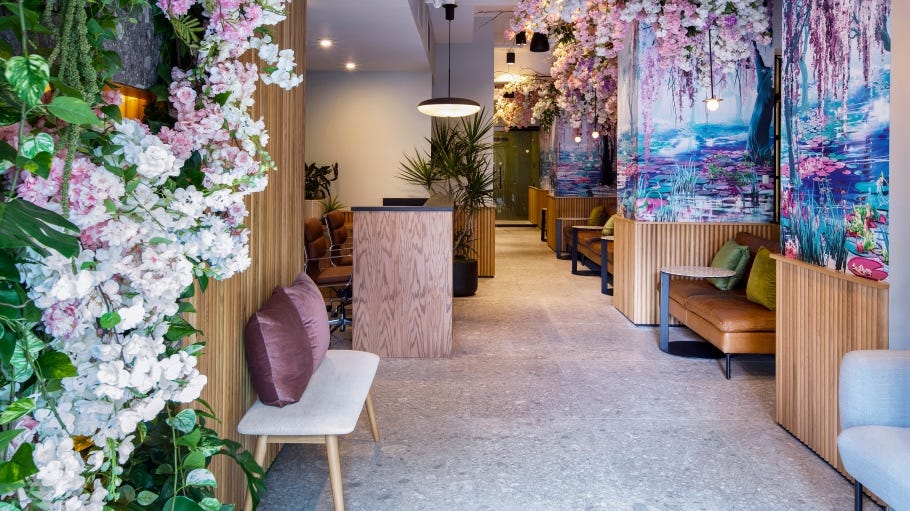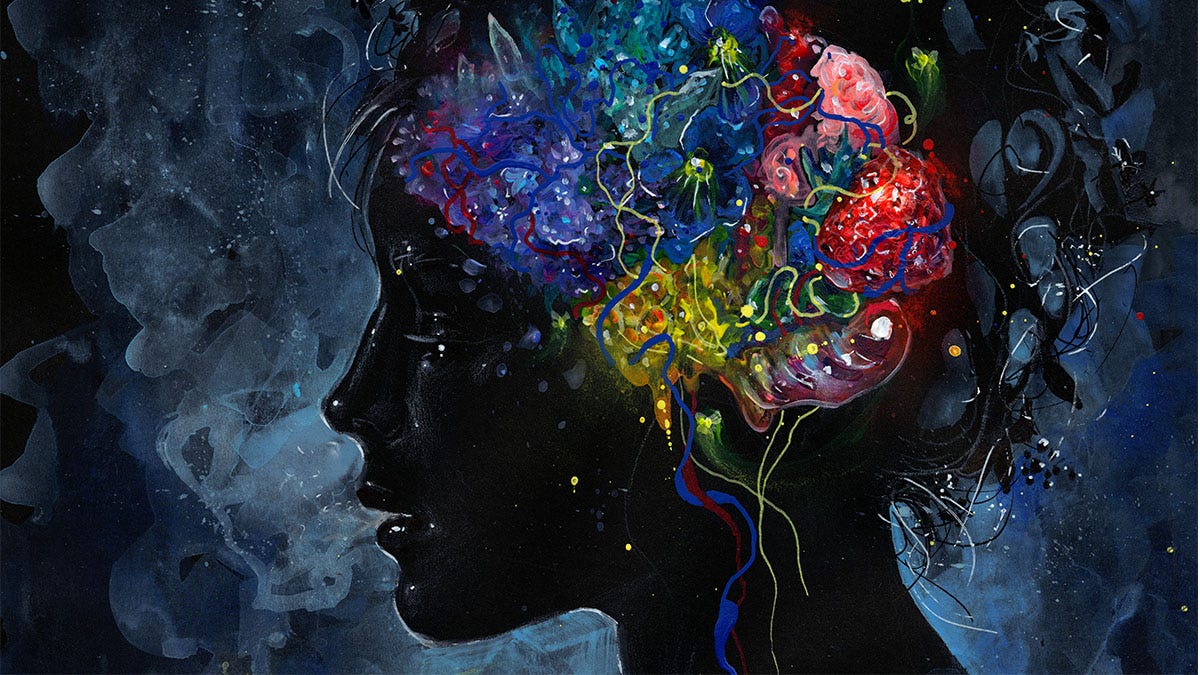Hey all, greetings from New York!
Vitamin Z is a newsletter about health and wellness. If you are new, you can join here.
When I was invited to visit Nushama’s Psychedelic Wellness Center, I wasn’t sure what to expect.
Nushama is a medically supervised psychedelic wellness center that provides intravenous (IV) ketamine for an ego-dissolving psychedelic experience. The center says Ketamine Psychedelic Therapy (KPT) can provide sustained relief from depression, anxiety, chronic pain, addiction and trauma-induced mood disorders.
I arrived at their flagship office in midtown Manhattan, got off the elevator and stepped into a candy-colored dreamscape. The space is lined with cherry blossoms and custom murals of nymphs dancing in tree branches. I was told Nushama’s aesthetic is inspired by rebirth.
Among US cities, there may be no better place to study new mental health treatments than New York.
New Yorkers are stressed-out and anxious. The city’s fast pace, the density—it’s overwhelming. Our bodies haven’t evolved to live in a place like this. You’re always in fight-or-flight mode. No wonder New York has more therapists and psychiatrists than any other US city.
Why are people excited about ketamine therapy?
Ketamine was once used mainly as an anesthetic on battlefields and in operating rooms. Now this medication is gaining ground as a promising treatment for depression, the leading cause of disability in the US among people ages 15 to 44.
Traditional medications for depression like SSRIs aren’t very effective. Talk therapy and other treatments like transcranial magnetic stimulation (TMS) and electroconvulsive therapy (ECT) may be effective but take weeks or months to have an effect. (I’ve written previously about neuromodulation—the use of electricity, sound waves and magnets to enhance physical and mental performance).
Covid caused a surge in people seeking treatment for anxiety and depression. Mental health providers have struggled to meet the rising demand. There’s a shortage of mental health professionals in many parts of the country.
Online therapy platforms like MDLive, Talkspace and BetterHelp grew rapidly in 2020. But it’s not clear they’re effective at treating serious mental illness.
Insurance companies provide very limited coverage for mental health services. If our country actually prioritized mental health, we’d have insurance that covers annual mental health checkups.
What does ketamine do?
Ketamine causes what doctors call a “dissociative experience” and what most anyone else would call a “trip.”
According to Nushama:
“When administered via IV, ketamine allows the patient to experience different planes of consciousness in a similar manner to other classical psychedelic medicines. It allows “ego dissolution,” which is viewed by many psychiatrists and other mental health practitioners as the doorway to healing.”
The FDA approved ketamine as an anesthetic in 1970. It was used in treating injured soldiers on the battlefields in the Vietnam War.
Researchers started noticing the drug’s potential as a treatment for depression and antidote to suicidal thoughts. The FDA in 2019 approved a nasal spray form of the drug called esketamine (Spravato) for depression. It’s for adults who haven’t been helped by antidepressant pills, have major depressive disorder, or are suicidal.
Last week Seattle became the latest US city to decriminalize the use and cultivation of psychedelics. Federal funding is opening up for scientific studies on how these substances can transform treatment for depression and addiction.
Psychedelic wellness centers have opened in countries outside the US, like Costa Rica and the Netherlands. They combine psychedelic treatment (ayahuasca, ibogaine or psilocybin) with yoga, breathwork, journaling, creative expression, floral baths, nature immersion, and community events.
A note of caution: As with any alternative healing experience, you should consult your own medical team and understand the risks before proceeding. Psychedelics are illegal in many countries and unregulated in others. The treatments described below are legal, but you should independently verify the legal status of any center before undergoing treatment.
How does it work?
While it’s not totally clear how ketamine works, the drug is thought to repair damage to the brain that is the result of long-term stress hormones.
Some researchers believe ketamine binds to NMDA receptors in the brain and increases the amount of a neurotransmitter called glutamate in the spaces between neurons. Ketamine may help people with long-term depression by forming new connections in their brains (called synapses) that let nerve cells communicate.
Zoe Boyer wrote a New York Times piece about her experience with ketamine therapy:
“I traveled backward in time, inhabiting memories in a pleasantly detached manner. I traveled forward, too, and visited places I’d never been. It felt as though I’d shed my corporeal form and was melding into the fabric of the universe.
It was as though a switch had been flipped and my brain lit up. I noticed color creeping back into the world, and the hard knot of dread and dispassion in my chest melted away.”
A psychedelic ketamine treatment at Nushama lasts about 45-60 minutes. The dissociative experience starts quickly and takes about 15 to 20 minutes to wear off after the drip ends. Nushama schedules 6 infusions within a 3-4 week period.
The center has a couples room with side-by-side, zero-gravity SVAGO chairs for a two-person journey.
Note: I did not try a ketamine treatment personally. I’m only sharing what I learned from speaking to Nushama staff.
How much does it cost?
Nushama charges $4000 for 6 ketamine infusions. Insurance may cover the cost of infusions if there’s a medical diagnosis of a pain condition. Insurance will not cover treatment if the diagnosis is only for a mood disorder like depression, PTSD, or addiction.
What medical supervision is provided?
Nushama is staffed by licensed medical practitioners and therapists to provide legal psychedelic-assisted treatment. A doctor is always on site during the process. The doctor isn’t necessarily in the room with the person being treated but is available if they need anything or become anxious or confused.
I met Dr. Steven Radowitz, who specializes in infectious diseases and opioid addictions and is a board-certified internist of Goldman Sachs Health Clinic. He told me there’s high interest in psychedelic therapy among Goldman employees.
Is it safe?
Ketamine for therapeutic treatment is considered safe when administered in a clinical environment by medical professionals. While dissociative, or “psychedelic” properties may be present even at low doses, a number of studies show they are positive mediators of the molecule’s antidepressant effects.
Can ketamine be addictive? “When ketamine is abused it can become addictive,” said Nushama Co-Founder and Chief Medical Officer, Dr. Elena Ocher:
“Like every kind of abuse—food, sex, video games, alcohol, and sleeping pills—it can be addictive if abused. This is why Nushama is rigorous about designing customized protocols for individual needs.”
Dr. Ocher said most psychedelic drugs are not addictive when used in a therapeutic environment supervised by physicians. However, clinical trials have barred people with substance abuse problems or people who have schizophrenia.
Legality: Ketamine is legal for medical use in the United States and select countries across the world. The use of ketamine is regulated, meaning it can only be administered or prescribed by licensed clinicians.
Nushama’s IV ketamine infusions are administered by board-certified anesthesiologists. You don’t need a physician referral, although any licensed mental health care professional or physician can refer you.
Ketamine treatment is not a magical cure for our nation’s mental health crisis. It’s expensive. We still need more research on the long-term effects.
Ketamine won’t replace traditional forms of therapy, but it could become a useful adjunctive therapy. Mental health experts say we need more effective tools to meet the growing challenges.
There simply aren’t enough psychiatrists and therapists for all the people who are struggling. Medication and technology are important ways to scale mental health services to the millions of Americans in need.
Experts believe the future of mental health may involve a multimodal approach, combining talk therapy and medications like ketamine with VR exposure therapy and transcranial magnetic stimulation (TMS).
I’d love to hear your thoughts. Would you try ketamine therapy? Why or why not?
Until next week,
By Daniel Zahler
Every week I write an email newsletter with perspectives on health and wellness trends, and strategies & tactics on how to optimize cognitive, physical and emotional health. I hold a JD and BA from Harvard, have worked at Goldman Sachs and McKinsey, and advise global business leaders as a GLG council member.
Check out my articles in Thrive Global here.
Enjoy this?
There are a few things to do:
Follow me on Twitter.
Hit reply with your feedback and ideas :)
Share this post with others.









hello there! I am about to start ketamine therapy treatments, in two days. I am very hopeful that it may help my long term depression and anxiety, but am also so anxious thinking: what if it doesn't? What if I spend all the money and time... only to have gone on a few journeys and be left with the same dysfunctional brain? So- I'm very nervous. I've also never done psychedelics before... so there's that anxiety as well! But... I keep try to remind myself to stay positive. This is a completely new experience for me, and all I can do is hope that I can feel free from this sadness/despair/empty soul and constant anxiety after these treatments. I don't know who to pray to, but may they hear my deepest prayers that I will do anything for these treatments to work. May they not only work for me, but may they bring to others solace and peace that they've been looking for and hopefully one day, just blissful happiness :). I'm encouraged by this first step in psychedelic treatment that this country, hopefully one day, will be on the right path to a legitimate form of holistic treatment.